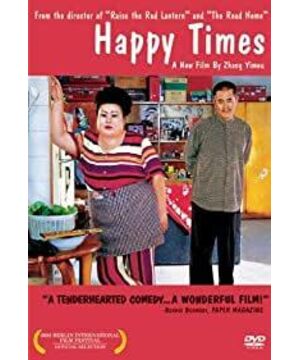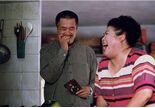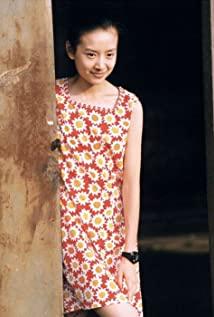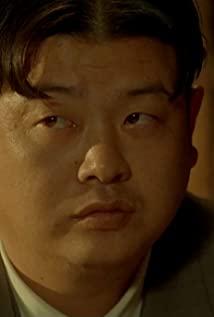Zhang Yimou's "Happy Time" in the air, I didn't feel it from the perspective of warmth. I even felt that the happiness flashed in the film was different from what I understood.
Zhang Yimou said that this is the worst film he has ever made. It can be said that shooting such touching subjects in China is almost the main theme of the box office pursuit.
And Zhang Yimou is known to domestic audiences as a so-called man who wins glory for his country at international film festivals. So this movie has been widely criticized.
These are all over.
Zhang Yimou's later films <
Today, I saw <
The protagonist Lao Zhao, played by Zhao Benshan, is an old bachelor who has tried his best to marry a daughter-in-law, and may even take his life. The pursuit of this little man reveals China's major national conditions: starting a family, or having children starting a family, occupies a fortress position in the value map of the vast majority of people in China.
There is a small character in the film <
Of course, the so-called purification in my senses stems from the charm of the northwest folk songs filled with yellow sand and the bloody temperament of the northern man when he was buried alive by the devil.
In real life, marrying a daughter-in-law is a tedious thing. If your conditions are not good, you have to be like Lao Zhao in <
The apprentice Xiao Fu asked Lao Zhao, don't you like thin women?
Lao Zhao said that thin women don't like me.
Lao Zhao is already in his fifties. He has a crush on a fat woman. He feels that this kind of woman can warm him more. And this fat woman just wanted to throw away the blind girl left by her ex-husband as a burden.
Of course, Lao Zhao became the one who took the burden.
The fat woman asked for 50,000 yuan, but Lao Zhao didn't have it, so he asked his apprentice Xiao Fu to borrow it.
Xiao Fu is also a small person, and he will not easily lend it to others if he has money, even if this person is his master. But in China, you should not explicitly reject a person. So although Xiao Fu didn't lend Lao Zhao any money, he helped him come up with an idea.
There is an old car in the park, and the park is a place for love and hormone regulation.
Xiao Fu wanted to tidy up the old carriage and make it a "Happy Time Cabin" for lovers in urgent need and to collect some ticket money.
When painting the walls, Xiao Fu first painted a gray paint, which Lao Zhao felt like a public toilet. The "urgent need" is not the urgent need of the urinary system, but the urgent need of the reproductive system. In the end, they painted a discarded red paint, and the deterioration of the paint made the red appear cloudy and ambiguous.
This is exactly the need for a tryst.
Soon a couple of men and women gave 20 yuan, the windows of the carriage were still tightly sealed, and the bed was fairly clean.
As for the object, you can do it with the door closed.
Lao Zhao quit, what is this called, in the daytime, in the park, a man and a woman close the door, what is this called.
I would rather not make this money, Lao Zhao would not allow others to do so. "Can't close the door" has become a key word in Lao Zhao's value dictionary.
On the surface, Lao Zhao is a typical traditional Taoist priest, but in fact his moral grammar stems from his own sexual repression.
There is such a saying. Put a crab in a basket and it will crawl out soon; put a group of crabs in a basket and they crawl around and trample each other, killing and injuring many; put two crabs in a basket and they will stick to the basket If one tries to crawl out, the other will surely drag it down.
The same is true of the Chinese. If I can't do it, don't do it either.
Xiao Fu's thinking is different from that of Lao Zhao. If they give you money, they will close the door if they want to. If you can't close the door, who will pay you back?
The actor of Xiao Fu is Fu Biao, his eyes and smile are shrewd with the typical shrewdness of small people. It's hard to imagine a character so comfortable in China's daily life dying young a few years later.
It is not explained in the play, but from the plot, it can be seen that the "Happy Time Cabin" is still in operation, that is, it is closed by default.
That's how vindicators are in the face of profit. However, this is understandable.
Lao Zhao told the fat woman that he was the general manager of a hotel.
Xiao Fu said, don't brag if you don't have money.
Lao Zhao said, if I don't blow it, she will blow it with me.
Lao Zhao was reluctant to buy roses for two yuan each. He bought a bunch of them for two yuan, trimmed them neatly, put on the only good clothes, and sent them across the street to the fat woman.
I think the time when the blind girl was deceived by everyone's good intentions was not the happy time she mentioned in the recording.
Pay attention to the hopeful expression and energy on Zhao Benshan's face when he is riding a bicycle, holding a rose, and looking forward to a good love or marriage on the way to the fat woman's house.
On the way through the fat woman, crossing the street again and again, this is the fucking happy time. Although this illusion of happiness was soon shattered.
The survival wisdom of the little people may not help Lao Zhao to analyze: he was originally chasing fat women, how to take care of blind girls who have nothing to do with him. In the "happy time" when the blind girl was deceived by good intentions, as a unit of Lao Zhao, the little people made a real appearance collectively.
They are kind and willing to help an old bachelor by helping him build an imaginary massage parlour and giving blind girls a job hope. Anyway, it is the workshop of the unit, and the materials of the unit are used as soon as they are used.
They were stingy and were unwilling to lend Lao Zhao money, and their money was not much.
They haven't seen the world, and they can't say a word of nonsense on the massage table.
They are in a hurry, and they feel that blind girls can't figure out the difference between paper and money.
They don't want to cause trouble, let the blind girl go.
They have sympathy, this child will not think about it, will not commit suicide.
They are afraid of trouble. If something happened to the blind girl, they will be implicated when the police investigate.
It is these kind-hearted people who find kind excuses and give away zero-cost warmth.
The hope of the blind girl is to earn enough money to go to her father, who will take her to treat her eyes. Dad went to Shenzhen with the hope of a blind girl. This letter, carried by the blind girl, contained only a simple excuse from her father: he lost money in the stock market. He didn't even mention his daughter.
It is ironic that there is a trace of real cold cruelty in the fictional warmth.
And Lao Zhao and Xiao Fu wanted to cover up this real cruelty with fictional warmth.
Lao Zhao had already been dumped by the fat woman. After being drunk and beaten, he made up a tender family letter for the blind girl. On the way home from writing, he got into a car accident.
Blind girls can't see, but they know. Fortunately, she regarded the fictional warmth as a happy time, she left a recording of her farewell, and she left.
Xiao Fu opened the bloody fictitious letter from home, searched for the illusion of dialogue in the blind girl's recording, and read it affectionately. Reminds me of a scene in the movie.
In order to please the fat woman, Lao Zhao took the blind girl to work in his "hotel".
His "hotel" was just an old carriage called Happy Times, but the park was going to be renovated with greenery and more flowers and plants. When he and the blind girl arrived, the old carriage had been lifted by a crane.
Happy time, dangling in the air.
View more about Happy Times reviews











